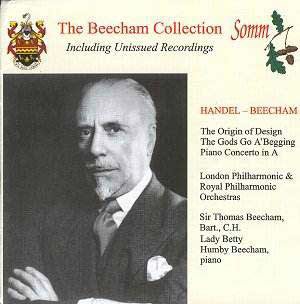A small admission. In the interests of critical objectivity
I listened to this disc three times and took copious notes. Then I threw
them away and listened again for the sheer pleasure of it. The vast
bulk of the CD is made up of previously unissued material. There are
two, differing suites of material from The Gods Go A’Begging, one with
the RPO in 1949 and the other with the pre-War LPO dating variously
from 1933-38. The Piano Concerto is from 1945. The only previously issued
pieces are the majority of that earlier LPO Gods Go A’Begging suite.
These Handel-Beecham arrangements were something of a staple of his
recording and performing career and gathered from various sources for
ballets and orchestral suites. They are, without exception, even to
a generation saturated with Handelian opera, delightful and imaginative
works teeming with the kind of orchestral felicities that make this
disc so vital and alive.
The disc is a series of examples of conductorly élan
and instrumental panache. Look no further than the early Origin of Design
– the clarity of the woodwinds in the Rondeau, the oboes’ chatter
and the violins’ interior voicings. Or the Minuet – massed strings,
but proper balance and articulation are maintained with sectional phraseology
of the finest especially the affecting middle voicings of the strings.
A couple of thumps on this side – previously unissued of course – have
been well minimised and are of no account. Beecham introduces some pizzicato
games in the Scherzo but he gives the strings their head in the
succeeding Sarabande. Part of this side had been badly damaged
– too much so to issue commercially – and so the undamaged part only
has been issued. Enough remains to listen to the most extravagant use
of portamento in the entire disc – precise but pervasive and deliberate.
The veiled tone of Beecham’s newly formed LPO can be heard in the Musette
and the conductor whips up a veritable hurricane in the Battaglia
and Finale. The Gods Go A’Begging is majorly commercially issued
performances but a couple of the movements have never before been released.
All are in excellent sound. Needless to say there are instances variously
of dramatic incision (Introduction), sinuous bassoons (Fugato)
delicious sensitivity (Minuet) – one of the highlights this,
with superb string/brass balancing, pizzicato-accompanying oboe figure,
the sheen and delicacy of the violins. Those yet to be convinced might
like to sample the linearity of string playing in the Musette
or the solo lines in the Minuet – where flute and trumpet shine
– and those who remember Beecham’s celebrated rejoinder on the subject
will be amused to find a conspicuously audible harpsichord in the Gavotte.
The Piano Concerto was written for Betty Humby Beecham
and she gave the first performance in New York in 1944. It’s a sizeable
four-movement 24-minute confection. There is tremendous rhetorical flourish
in the opening, very grand and persuasive Chaconne – and also sensitive
exchanges between soloist and orchestra, variously playful and reflective.
The Romanza is rather mysterious and withdrawn with the oboe’s
caressing figure coursing through it and the chocolate brown strings
lending weight to its air of tristesse. The Minuet is oddly pensive
and reluctant and very slow until warmed up by the strings whereas the
finale is a steady and avuncular affair with a somewhat weak ending.
One can but admire Beecham’s persistence in stitching together the work.
The 1949 Gods Go A’Begging suite consists of six movements played by
the newly formed RPO – instrumentally vivacious and sharing qualities
consonant with the playing on the entire CD. And previously unissued.
With good notes by Graham Melville-Mason and high production
values this is a CD of almost limitless pleasure.
Jonathan Woolf


